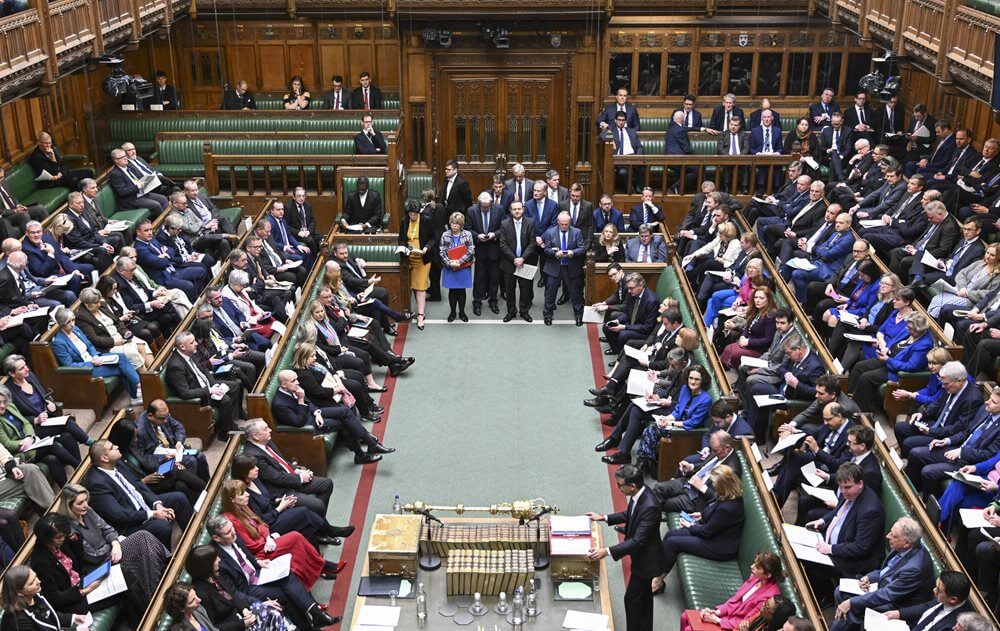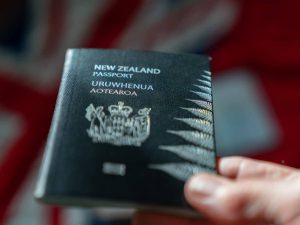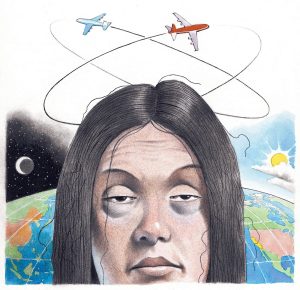On December 4, 2023, the Home Secretary, James Cleverly, revealed upcoming modifications to visa regulations, describing them as part of a “five-point plan” aimed at curbing immigration. Additional details were provided by the Home Office on December 21, which included some revisions to the original announcement.
These changes are now in effect, following two sets of amendments to the Immigration Rules published on February 19 and March 14. Which affects UK work visa rules.
Related article: Sky High Alert: Ryanair CEO Signals Fare Hike Amid Plane Shortage
Related article: Unlocking Dubai: Indians Granted Five-Year Multiple Entry Visa!
The Five Changes Family And Work UK Visa Rules
- Social care workers are now prohibited from bringing dependents (i.e., partners and children) on their visas.
- The minimum salary required to be sponsored for a Skilled Worker visa has increased from £26,200 to £38,700, and the specific minimum salary for each job has also risen considerably.
- The list of jobs eligible for sponsorship under the Skilled Worker visa at a reduced minimum salary has been shortened and is now called the Immigration Salary List.
- The minimum income typically needed to sponsor someone for a spouse/partner visa has increased from £18,600 to £29,000.
- The Graduate visa, a two-year unsponsored work permit for international graduates of British universities, is under review.
When Are These Changes To Take Effect?
The restriction preventing newly arriving care workers from bringing immediate family members was implemented on March 11, 2024.
The minimum salary for Skilled Workers was increased on April 4, 2024.
On the same day, an interim Immigration Salary List, which replaces the Shortage Occupation List, was introduced and will be reviewed later this year.
The minimum income requirement for spouse/partner visas rose to £29,000 on April 11, 2024, with plans to increase it to approximately £34,500 later in the year and eventually to about £38,700 by early 2025.
The review of the Graduate visa has commenced, with the Home Secretary requesting a report by May 14, 2024.
What Parliament Thinks About These Changes
Visa regulations are revised through statements of changes to the Immigration Rules. The Government has presented two statements to Parliament to implement these changes, one on 19 February 2024 (regarding care worker dependants) and another on 14 March 2024 (concerning family and work visa income thresholds).
These statements of changes automatically come into effect unless either the House of Commons or House of Lords actively votes to annul them within 40 days. Typically, there is no vote, and the Government is not required to schedule time for one in the Commons even if MPs propose motions against the changes (as Alison Thewliss of the Scottish National Party has done with Early Day Motions 573 and 574).
A Westminster Hall debate on the family visa changes took place on 23 April, sponsored by Paul Blomfield (Labour). This debate will not involve a vote.

Why The Government Came Up With These Changes
Ministers are of the opinion that immigration levels are excessively high. In 2022, net migration (the difference between the number of immigrants and emigrants) was tentatively estimated to be 745,000.
The recent surge in net migration is primarily driven by international students, social care workers, and their dependants, in addition to humanitarian visa schemes and asylum seekers.
The modifications announced in December follow the restrictions on student dependant rules that were separately revealed in May 2023 and have been effective since the beginning of 2024. According to the Home Office, 300,000 of those who relocated to the UK last year would have been unable to do so if these changes had already been implemented.
Conclusion
On December 4, 2023, Home Secretary James Cleverly announced a “five-point plan” to curb immigration, which was detailed further by the Home Office on December 21. These changes, now in effect following amendments on February 19 and March 14, include:
- Social care workers can no longer bring dependents.
- The minimum salary for a Skilled Worker visa increased from £26,200 to £38,700.
- The Immigration Salary List has replaced the Shortage Occupation List, shortening the list of jobs eligible for reduced minimum salaries.
- The minimum income to sponsor a spouse/partner visa rose from £18,600 to £29,000, with further increases planned.
- The Graduate visa for international graduates is under review.
Implementation dates are staggered: care worker restrictions began on March 11, 2024, Skilled Worker salary changes on April 4, 2024, and spouse/partner visa income requirements on April 11, 2024. The review of the Graduate visa is ongoing, with a report due by May 14, 2024.
Parliamentary responses include a debate on family visa changes, though no votes are expected. The government introduced these changes in response to high immigration levels, driven by international students, social care workers, their dependents, and humanitarian visas. These changes follow restrictions on student dependents effective from early 2024. The Home Office estimates that 300,000 fewer people would have immigrated if these rules were in place last year.
Frequently Asked Questions On These 5 Changes
Does the £29,000 income threshold for spouse/partner visas apply to extensions, or just to new applicants?
Available only to first-time applicants. Initially, a Government spokesperson indicated that the higher threshold would apply to visa extensions, but the Home Office later clarified that it will not. The notes accompanying the Immigration Rules published on 14 March clarify:
Transitional arrangements are in place for those who, before 11 April, already have a Family visa within the fiancé(e) or proposed civil partner or five-year partner route, or who applied before 11 April and are now being granted a visa. Once the minimum income requirement (MIR) is met, the same MIR must be maintained until settlement on the route, provided the applicant is applying to remain with the same partner.
This means that individuals whose fiancé(e), partner, or spouse applied for a visa before 11 April 2024, will only need to demonstrate a minimum income of £18,600 per year. This transitional exemption applies to their initial visa application, subsequent visa extension applications, and future applications for settlement (indefinite leave to remain).
Can You Combine Both Applicant and Sponsor Incomes to Meet the £18,600 / £29,000 Requirement?
When applying for the initial visa from outside the UK, only the sponsor’s income is considered for meeting the minimum income requirement. For visa extensions and permanent residence applications, the incomes of both the applicant and the sponsor are taken into account. Typically, applicants must show proof of earning the required income over the last six months, although the specific regulations are complex.
There are alternative methods available for those who do not meet the minimum income threshold. These include qualifying through savings exceeding £16,000 or under exceptional circumstances.
None of these requirements have changed.
Are Your Savings Still Part of the Minimum Income Check?
Indeed. The fundamental guideline remains unchanged: solely savings exceeding £16,000, halved by 2.5, contribute to meeting the threshold.
Typically, individuals combine savings with the sponsor’s income to reach the threshold, although they have the option to rely solely on savings. For a couple without pertinent earnings aiming to meet the threshold exclusively through savings, they now require a lump sum totaling £88,500.
Similar to the primary income regulation, individuals usually must maintain the necessary savings amount in their account(s) for six months before initiating the application process.
Are Armed Forces Members Seeing a Boost in Minimum Income for Partner Visa Sponsorship?
Certainly, however, solely up to £23,496, which is the minimum wage for the armed forces.
How do other nations spice up spouse visa requirements with minimum income regulations?
Numerous nations mandate evidence of adequate financial means. The manner in which this prerequisite is articulated and evaluated varies, making precise comparisons challenging.
In instances where nations stipulate the necessity of a minimum income, as observed in Belgium or Norway, extensive research has yet to uncover instances where the threshold exceeds or closely approaches £38,700 (the target the UK Government ultimately aims to achieve). Additionally, the UK’s criteria regarding which income sources contribute to meeting the threshold are more stringent compared to other nations, as outlined by the Migration Observatory at Oxford University.
Critics of the minimum income policy frequently reference a ranking known as the Migrant Integration Policy Index or MIPEX. In the year 2020, the UK ranked second to last among 56 nations in terms of facilitating family reunion. This ranking incorporates minimum income-style regulations, alongside various other factors, in assessing and comparing different countries.
How do the beefed-up salary requirements impact those already holding Skilled Worker visas?
The Minister for Legal Migration declared in December 2023 that individuals presently under the Skilled work route and those who lodged applications prior to the rule alterations would not be bound by the new £38,700 salary benchmark when transitioning jobs, seeking extensions, or settling.
According to the updated Immigration Regulations, individuals holding a Skilled Worker visa before April 4, 2024, and who apply for an extension or settlement before April 4, 2030, are exempt from meeting the current thresholds imposed on initial applicants. They are only required to receive the higher of either £29,000 (as opposed to £38,700) or the ‘lower going rate’ for their occupation, rather than the ‘standard going rate’.
First-time applicants for the Skilled Worker visa after April 4, 2024, may still receive compensation below the new salary benchmarks under specific conditions. This applies to individuals at the outset of their careers, such as those below 26 years old or those holding a Graduate visa. Furthermore, different salary scales apply to NHS and education personnel, which are aligned with national pay structures. Social care workers are treated uniquely and may receive £23,200 in compensation.













One Response